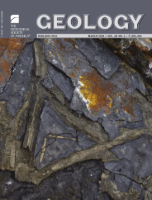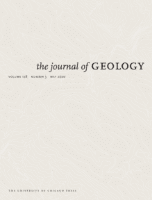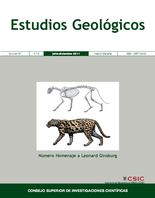
EARTH SCIENCES HISTORY
Scope & Guideline
Unveiling the Historical Tapestry of Earth Sciences
Introduction
Aims and Scopes
- Historical Geology:
Investigates the evolution of geological theories and practices over time, including the contributions of significant figures and milestones in the field. - Mining and Mineralogy History:
Explores the historical context of mining practices, mineral discoveries, and the development of mineralogy as a scientific discipline. - Women in Earth Sciences:
Highlights the roles and contributions of women in the field of earth sciences, emphasizing their historical significance and impact on scientific advancements. - Military Geology:
Examines the intersections between geology and military operations, particularly during significant historical events such as World Wars. - Cultural and Societal Influences:
Analyzes how geological knowledge has influenced and been influenced by cultural, societal, and environmental contexts throughout history. - Stratigraphy and Paleontology:
Focuses on the historical development of stratigraphic principles and paleontological discoveries, contributing to our understanding of Earth's history.
Trending and Emerging
- Interdisciplinary Approaches:
There is a growing trend towards interdisciplinary studies that integrate geology with history, sociology, and cultural studies, enriching the understanding of earth sciences in historical contexts. - Global Perspectives on Geology:
Recent publications indicate an increasing focus on global geological narratives, examining the interconnectedness of geological developments across different regions and cultures. - Biographical Studies of Geologists:
An emerging theme is the biographical exploration of influential geologists, shedding light on their contributions and the historical context of their work. - Impact of Climate Change on Historical Geology:
The relevance of historical geology in understanding contemporary climate change issues is gaining traction, linking past geological events to current environmental challenges. - Digitization and Historical Data:
The use of digital tools and archives to explore and present historical geological data is becoming more prevalent, facilitating broader access and analysis of historical records.
Declining or Waning
- Modern Geological Techniques:
The historical analysis of modern geological techniques and technologies has become less prominent, possibly due to a shifting focus towards historical narratives rather than contemporary methodologies. - Contemporary Environmental Geology:
There has been a noticeable reduction in discussions surrounding contemporary environmental geology and its historical context, which may be overshadowed by current environmental crises. - Geological Controversies:
Although debates and controversies in geology have been a staple, recent publications suggest a waning interest in historical controversies, perhaps as the field matures and settles into established narratives. - Regional Geology Studies:
Studies focused on specific regional geological histories have decreased, potentially in favor of broader, more global perspectives on geological developments. - Geological Education History:
The exploration of the history of geological education appears to be less frequent, indicating a possible shift towards practical applications and current educational methodologies.
Similar Journals

BULLETIN OF GEOSCIENCES
Pioneering Insights in Earth and Planetary SciencesBULLETIN OF GEOSCIENCES, published by the prestigious Czech Geological Survey, stands as a pivotal resource in the fields of Earth and Planetary Sciences and Environmental Science. Since its inception in 2003, the journal has been committed to advancing knowledge through high-quality research, currently holding a commendable Q2 ranking in both disciplines. With its focus on diverse and innovative topics, BULLETIN OF GEOSCIENCES provides an essential platform for researchers, professionals, and students aiming to disseminate and access impactful studies. The journal is indexed in Scopus, ranking #78/195 in General Earth and Planetary Sciences and #110/233 in General Environmental Science, reflecting its significant contribution to academia. Publishing from Prague, Czech Republic, this journal invites contributions that illuminate the interactions between geological processes and environmental phenomena, ensuring an inclusive and accessible approach to crucial global issues.

GEOLOGY
Transforming Geological Research into Global KnowledgeGEOLOGY, published by the Geological Society of America, Inc, is a premier journal dedicated to advancing knowledge, research, and discussion in the field of geology. With an ISSN of 0091-7613 and an E-ISSN of 1943-2682, this journal stands out with an impressive Q1 ranking in Geology for 2023, positioning it among the top journals in the realm of Earth and Planetary Sciences, specifically holding a remarkable rank of 11 out of 321, reflecting its 96th percentile status. This journal aims to publish innovative research articles that cover all aspects of geology, from tectonics and sedimentology to paleontology and mineralogy, offering invaluable insights for researchers, professionals, and students alike. Although not currently open access, GEOLOGY maintains a rigorous review process ensuring the quality and integrity of the research it publishes. For more than five decades, spanning from its inception in 1973 to the upcoming publications in 2024, GEOLOGY has been instrumental in shaping the geological discourse and continues to be a vital resource for the scientific community.

JOURNAL OF GEOLOGY
Bridging Theory and Practice in Geosciences.The JOURNAL OF GEOLOGY, published by University of Chicago Press, serves as a premier platform for disseminating groundbreaking research in the field of geology. Established in 1973, this esteemed journal has consistently ranked in the Q2 category in geology, further solidified by its Scopus ranking, where it is positioned at 99 out of 321 in Earth and Planetary Sciences, marking it in the 69th percentile of its category. With an emphasis on innovative and interdisciplinary studies, the journal features peer-reviewed articles that contribute to the understanding of geological processes, earth materials, and environmental interactions. Although it does not currently offer open access, it facilitates broad access through academic institutions to reach a global audience of researchers, professionals, and students striving to advance the knowledge of Earth's history and dynamics. As a vital resource for the geology community, the JOURNAL OF GEOLOGY plays an essential role in fostering scholarly dialogue and advancing both academic inquiry and practical applications in geology.

ESTUDIOS GEOLOGICOS-MADRID
Unlocking the Potential of Geological Research in Madrid.ESTUDIOS GEOLOGICOS-MADRID is a prominent journal in the field of geology, published by the esteemed Consejo Superior de Investigaciones Científicas (CSIC) in Spain. Established in 1976, this Open Access journal has been a vital resource for researchers and professionals since its inception. With an impact factor reflecting its contribution to the Earth and Planetary Sciences community, ESTUDIOS GEOLOGICOS-MADRID currently holds a Q3 category ranking in Geology as of 2023, showcasing its relevance and quality within the discipline. The journal publishes a diverse array of geological studies, ensuring wide-reaching access to significant research findings, thereby promoting collaboration and knowledge sharing. Established as a platform for both foundational research and applied geology, this journal fosters academic growth and contributes to understanding the Earth’s processes. Researchers, professionals, and students are encouraged to explore its extensive archive, which includes publications from 1976 to the present. For more information, visit the journal's editorial office at Editorial CSIC, C/VITRUVIO 8, 28006 MADRID, SPAIN.

Journal of the Geological Society of Korea
Bridging Research and Practice in GeologyJournal of the Geological Society of Korea, published by the Geological Society of Korea, is a pivotal platform for researchers and professionals in the field of geology and earth sciences. With an ISSN of 0435-4036 and an E-ISSN of 2288-7377, this journal fosters the dissemination of scholarly articles that encompass a wide range of topics within earth and planetary sciences. Despite being categorized as Q3 in both Earth and Planetary Sciences (miscellaneous) and Geology, the journal has made significant strides in contributing to academic discourse, with a Scopus rank indicating robust participation in its academic field. Located in Seoul, South Korea, the journal aims to provide a comprehensive resource for the geological community, inviting submissions from both Korean and international researchers alike. With the convergence of years from 2019 to 2024, the Journal of the Geological Society of Korea stands as a vital resource for advancing our understanding of geological phenomena and fostering collaboration within the global geosciences community.

FACIES
Pioneering Knowledge in Geology, Paleontology, and StratigraphyFACIES is a prominent academic journal published by Springer, dedicated to advancing knowledge in the fields of Geology, Paleontology, and Stratigraphy. With its rich history since 1979 and an impactful convergence of research efforts extending through 2024, FACIES has established itself as a vital resource for scholars and practitioners. The journal boasts impressive ranking metrics: it is positioned in Q2 within Geology and Stratigraphy, and Q1 in Paleontology, reflecting its high-quality contributions to the academic community. Furthermore, its notable Scopus ranks—#28 in Paleontology, #16 in Stratigraphy, and #91 in Geology—underscore its influence and relevance. Although not an open-access journal, FACIES continues to provide significant findings that inform geological practices and enrich our understanding of past and present Earth systems. It serves as an essential platform for innovative research, making it invaluable for researchers, professionals, and students who seek to impact the fields of Earth sciences.

Boletin de Geologia
Exploring the Depths of Earth and Planetary Sciences.Boletin de Geologia is a prominent open-access journal published by UNIV INDUSTRIAL SANTANDER, dedicated to advancing the field of Earth and Planetary Sciences. Since its transition to open access in 2000, this journal has provided a platform for researchers to disseminate their findings and engage with the global scientific community. With an ISSN of 0120-0283 and an E-ISSN of 2145-8553, it is indexed in Scopus and has secured a notable Q3 ranking in the category of miscellaneous Earth and Planetary Sciences as of 2023, reflecting the impact and relevance of its published articles. The journal's geographical scope, rooted in Colombia, allows it to highlight significant geological research pertinent to the region while also contributing to global discussions. Scholars and practitioners interested in innovative research within this field will find Boletin de Geologia an invaluable resource for unlocking knowledge and fostering collaboration in the geological sciences.

GEOLOGIA CROATICA
Elevating Geological Research for AllGEOLOGIA CROATICA is a distinguished open-access journal published by the Croatian Geological Survey, dedicated to advancing the field of Earth and planetary sciences. Since its inception in 1992, this peer-reviewed journal has become an essential resource for researchers, professionals, and students interested in various aspects of geology. With its robust impact factor and a prestigious place in Scopus rankings, ranking 127th out of 321 in Geology and 77th out of 159 in miscellaneous Earth and Planetary Sciences as of 2023, GEOLOGIA CROATICA maintains a strong international presence. It provides a platform for the dissemination of critical research findings, promoting collaboration and knowledge sharing among the global scientific community. By focusing on high-quality manuscripts that cover geological processes, hazards, and resources, this journal is pivotal for anyone looking to contribute to or expand their understanding of geological sciences. The journal's commitment to open access ensures that invaluable research is accessible to all, fostering a more informed and scientifically engaged society.

Journal of Geosciences
Unveiling the Secrets of Our Planet, One Study at a TimeJournal of Geosciences is a distinguished peer-reviewed journal published by CESKA GEOLOGICKA SPOLECNOST, based in the Czech Republic, that serves as a vital platform for the dissemination of innovative research in the field of Earth and Planetary Sciences. With an ISSN of 1802-6222 and E-ISSN of 1803-1943, this journal has established its significance within the academic community, evidenced by its Q3 ranking in both Earth and Planetary Sciences and Geology. The journal covers a broad array of topics, making it an essential resource for researchers, professionals, and students interested in geoscientific advancements and discoveries. The Journal of Geosciences reflects a commitment to high-quality scholarship, embracing a variety of methodologies and interdisciplinary approaches, and provides open access to its content, thereby encouraging global collaboration and knowledge sharing among geoscientists. With a publication history converging from 2007 to 2024, it continues to be a prominent venue for critical conversations and developments in the ever-evolving field of geosciences.

Mineralogical Journal-Ukraine
Bridging knowledge and collaboration in mineral research.Mineralogical Journal-Ukraine is a key academic publication dedicated to advancing the field of mineralogy and geochemistry, under the esteemed auspices of the M.P. Semenenko Institute of Geochemistry, Mineralogy & Ore Formation of NAS Ukraine. Since its inception in 2019, this journal has established itself as an essential resource for researchers and professionals engaged in the study of energy, fuel technology, and the earth sciences, despite its present rankings reflecting a developing impact within these specific categories on Scopus. Published in Ukrainian and available in both print and online formats, the journal not only aims to disseminate high-quality research but also encourages inclusive access to vital findings in mineral exploration, petrology, and geochemical processes. With a commitment to excellence and an expanding scope of research, Mineralogical Journal-Ukraine stands as a pivotal platform for innovation and collaboration among scientists striving to understand the complexities of mineral formation and ore deposits.